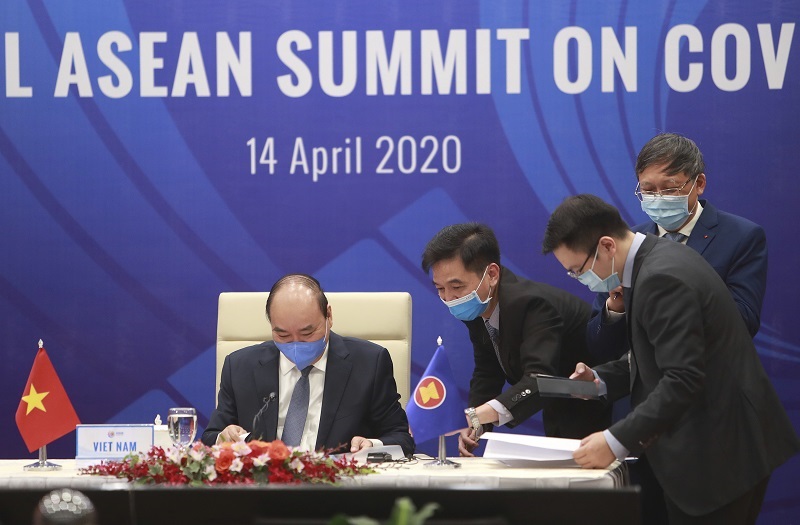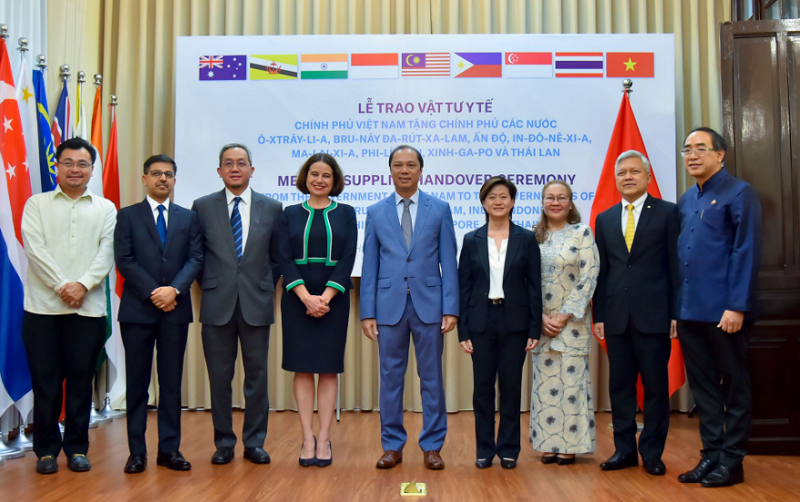Vietnam promotes ASEAN Centrality amid global struggle for safety
ASEAN stays united with common efforts against the pandemic and consensus on recovery plans.
International experts have opined that Vietnam has done a good job when helping connect ASEAN member states by successfully hosting regional meetings and proposing recovery agendas in the context of unprecedented challenges.
| Vietnam launches regional initiatives against Covid-19 since the beginning of the pandemic. Photo: VGP |
Vietnam has been able to promote the ASEAN Centrality and profile at a time the region and the rest of the world are grappling with the Covid-19 pandemic, according to Kavin Chongkittavorn, Senior Fellow, Institute of Strategic and International Studies (ISIS), Thailand.
Lucio Blanco Pitlo, a research fellow at the Asia-Pacific Pathways to Progress Foundation in the Philippines, said Vietnam was able to ably perform its role as this year’s ASEAN Chair despite tough circumstances.
Mr. Pitlo told VnExpress that one reason that all ASEAN partners did not miss any online meetings hosted by Vietnam was its success in containing the Covid-19 pandemic.
Hanoi deftly balanced the urgency of responding to the pandemic and stimulating economic recovery while pursuing the aspiration to foster ASEAN community-building and connectivity.
Vietnam’s relative success despite limited resources provided valuable lessons for its neighbors, he said, adding that its "mask diplomacy" and economic performance have enhanced its leadership profile when much of the region was reeling from the pandemic’s blows.
Pham Quang Vinh, former deputy foreign minister, said that Vietnam sustained consultations among ASEAN members and its partners to have fruitful meetings during the pandemic.
Mr. Vinh, a former head of the ASEAN Senior Officials’ Meeting Vietnam (2007 - 2014), described the consultations as a tool to keep ASEAN "vitality."
"It was conducted before meetings to build agendas and action plans," he said.
| Vietnam offers medical supplies to regional countries. Photo: Tuan Anh |
Meanwhile, Mr. Chongkittavorn said Vietnam has consolidated the ASEAN positions on regional issues including the fight against Covid-19 and balancing the bloc's relations with the US and China.
In the South China Sea issues, Vietnam’s chairpersonship has been able to place added emphasis on the relevance of international laws including the United Nations Convention on the Law of the Sea (UNCLOS 1982). Vietnam also has strengthened cooperation and dialogue with dialogue partners, he said.
The bloc now has 10 dialogue partners namely Australia, Canada, China, EU, India, Japan, New Zealand, Russia, South Korea, and the US.
“All in all, Vietnam has achieved its noble objectives of transforming ASEAN into a more cohesive and responsive organization," he added.
Ambassador Vinh noted that partners continued to show their respect for the role of ASEAN because they have had established strong cooperation in recent decades through various ASEAN-led mechanisms such as EAS, ARF and ADMM-Plus. They have been discussing different key challenges like climate change, sea-level rise, the East Sea, and Mekong water management.
This year, key partners agreed to closely work with ASEAN to cope with Covid-19, on economic recovery and health issues, he emphasized.
Emeritus Professor Carl Thayer of the University of New South Wales, Canberra, said “Vietnam’s success in containing Covid-19 enhances the credibility of Vietnam’s leadership role as ASEAN Chair in the regional fight against the coronavirus.”
“Other ASEAN members that are struggling against the coronavirus can look to Vietnam’s experience as they work together to devise a regional response. Vietnam’s success in the fight against the coronavirus is also reassuring ASEAN members that Vietnam can devote the time and energy needed as ASEAN Chair to address how ASEAN members can plan their recovery,” Mr. Thayer added.
As of November 25, all ASEAN member states have suffered from Covid-19 with Indonesia having the most confirmed cases, 506,302 and 16,111 deaths, followed by the Philippines with 421,722 infections and 8,185 deaths; Myanmar 82,236 and 1,784; Malaysia 58,847 and 341, Singapore 58,183 and 28; Thailand 3,926 and 60, respectively.
Vietnam has reported 1,312 cases and 35 deaths. As of November 25, the country has undergone 84 days without local transmission.
Vietnam said that Covid-19 has proven that the country's theme of "Cohesive and Responsive" picked for its ASEAN Chair 2020 is best suited to the current situation. Indeed, the country’s performance during the pandemic, including Hanoi’s response to the coronavirus outbreaks has made the way it leads the region’s efforts.
According to Prof. Thayer, the outbreak of Covid-19 was unexpected and it upended ASEAN’s advance planning to deal with a range of issues, such as community building. Under Vietnam’s leadership, videoconferencing was introduced to bring ASEAN leaders together to agree on common policies.
In the 37th ASEAN Summit that concluded in Hanoi in November 15, the regional countries ratified the ASEAN Comprehensive Recovery Framework to make it basis for the joint efforts in promoting the economic recovery in the whole region.
On this occasion, the region and its partners established and contributed to the ASEAN Covid-19 Response Fund and the ASEAN Regional Reserve of Medical Supplies. Vietnam pledged to contribute US$5 million worth of medical equipment to the reserve.













